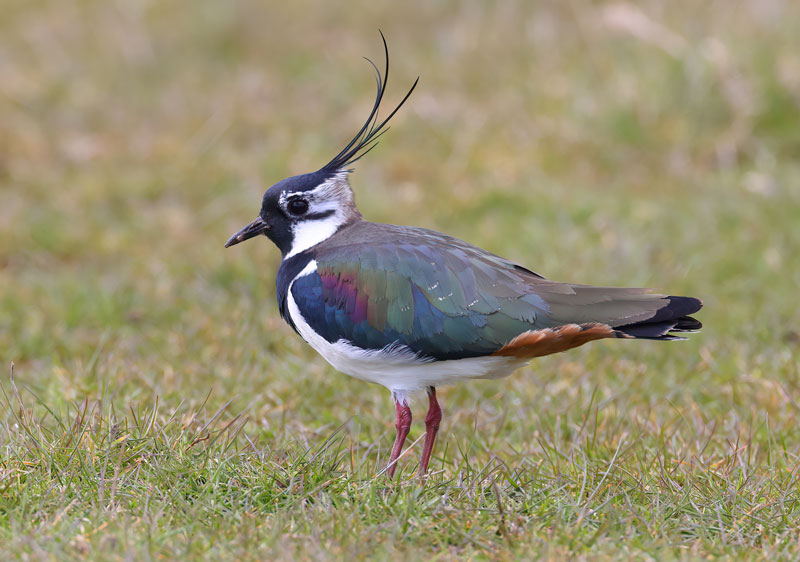RSPB NI and partners celebrate the successes of six-year Co-operation Across Borders for Biodiversity (CABB) Project.
Since its inception in 2017, the Co-operation Across Borders for Biodiversity (CABB) project has had outstanding success. RSPB NI has led on the CABB project, helping to restore over 3,000ha of blanket bog, safeguarded almost 900 pairs of breeding wading birds, and managed more than 170ha of land for butterflies.
The project was supported by the EU’s INTERREG VA Programme, managed by the Special EU Programmes body with funding of €5 million, with match funding from the Department of Agriculture, Environment and Rural Affairs in Northern Ireland (DAERA) and the Department of Housing, Local Government and Heritage Ireland. The project was delivered through partnerships with RSPB Scotland, Birdwatch Ireland, Butterfly Conservation, Moors for the Future and Northern Ireland Water.
CABB has delivered eight Conservation Action Plans that will protect over 39,000ha of peatland, and associated species including curlew, marsh saxifrage and hen harrier. Peatland restoration work carried out across Ox Mountains near Sligo, Muirkirk in Ayrshire and Garron Plateau in Antrim has helped to lock away 4.5m tonnes of carbon, helping to mitigate climate change. Drain blocking on the Garron Plateau by NI Water, in partnership with RSPB NI, also allowed sphagnum mosses and other species to recolonise, as well as delivering flood prevention and improving water quality.

Lapwing, copyright Glyn Sellors, from the surfbirds galleries
Through working in partnership with Butterfly Conservation, CABB has been able to conserve habitats and key species such as the marsh fritillary butterfly at Montiaghs Moss, on the Pettigoe Plateau and in Co. Leitrim. This has resulted in greater potential for breeding success, with adult butterflies already utilising the newly managed lands to lay eggs. The project has also successfully safeguarded homes for nearly 900 pairs of breeding waders in Lough Erne, Donegal and at Gruinart on Islay. Actions at key nesting sites, including predator proof fencing installation and sea-wall consolidation gives endangered breeding waders a chance for survival.
Over the last six years, this three-country, six-partner conservation project has been working to improve habitats for birds, butterflies, and plants across several Special Areas of Conservation (SACs) and Special Protection Areas (SPAs) in Northern Ireland, Ireland, and Scotland.
Joanne Sherwood, Director RSPB NI said “Restoration of blanket bog on such a large scale has enabled us to create high quality habitat to enable threatened species including hen harrier, marsh fritillary butterfly and lapwing to start to thrive.
This work would not have been possible without the collaboration between government departments and other partner organisations, both here and in neighbouring countries. These alliances ensured challenges were overcome and a better future secured for the species and people who depend on this beautiful, but fragile, habitat.”
Agriculture, Environment and Rural Affairs Minister Edwin Poots MLA said: “I am delighted to learn of the successful completion of the INTERREG VA-funded CABB project and its vital work to restore important wetland habitats across Northern Ireland to support species recovery, including the impressive work at the Garron Plateau. I would like to congratulate the project partners on their effective development of conservation management plans and conservation action for habitat restoration and species conservation throughout the Interreg Programme area.
Through their partnership-led approach, CABB has developed a stakeholder focused delivery model that will work well towards meeting our ambitious biodiversity and climate targets. My Department looks forward to continuing to work with similar consortiums to deliver nature recovery and climate action in the future”.
Minister Malcolm Noonan TD, Minister of State for Heritage and Electoral Reform said: “This project, working in partnership for nature across borders, is truly inspirational and impactful. I am absolutely delighted with the focus by the CABB project on the delivery of improvements to the condition of wetland and peatland habitats and species. In particular the fostering of cooperation and shared understanding amongst project partners and competent authorities, both now and into the future, is very much welcomed.”
Gina McIntyre, CEO of the Special EU Programmes Body said “The CABB project is a fantastic example of collaboration between organisations in three jurisdictions to solve shared environmental issues, which is an objective of the Interreg VA Programme.
Partnerships between countries, between statutory organisations, charities, and between neighbours as landowners and farmers, have achieved incredible results in protecting vital habitats for the future.
As well as so many species being protected, we are also seeing the additional benefit in the fight against climate change with the protection and restoration of peatlands, and this project will therefore continue to provide benefits long into the future.”
Sara Venning, CEO of NI Water said, “We are very proud to be a partner in the CABB project and the restoration of almost 500 hectares of blanket bog at Garron Plateau. Garron is in a catchment area which supplies high quality drinking water to almost 12,000 homes and businesses in the North Antrim area. This project not only enhances and protects this vital water source, but it also helps mitigate climate change by capturing carbon and enhances biodiversity and habitats which are home for many rare and protected species.”
As CABB comes to an end, RSPB NI will continue to expand on the great works delivered through the project to safeguard additional habitats and key species. A special thanks to main funding contributors: the Special EU Programme Body (SEUPB) and the INTERREG VA Funding programme.